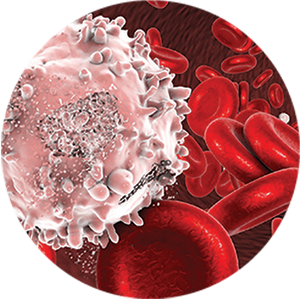Blood based monitoring for all solid organ tumours
cancertrack is a blood-based analysis that detects cancer related biomarkers with ultrahigh precision, specificity and reliability. cancertrack enables continuous monitoring of the cancer in order to detect relapses or changes in the tumour characteristics at an early stage.

About cancertrack
cancertrack can be used to monitor the disease / recurrence or changes in the tumour characteristics, as often as necessary.
Features of cancertrack
- Detection of circulating DNA, which is released into the patient's blood by cancer cells (ctDNA); if necessary, in combination with circulating tumour cells (CTCs)
- Detection of tumour activity at an early stage
- Real-time adaption of the medication based on the test results
- Additionally: monitoring of non-visible metastases and tumours
- Limits of detection: 0.1% (Minor Allele Frequency)
- Secure, simple and cost-effective
cancertrack is suitable for

... every patient who is under treatment for cancer.

... every person who has been diagnosed with cancer, as a supplement to conventional biopsy and imaging.

... every patient who is in remission / a cancer survivor and needs monitoring.
Monitoring cancer
Optimally, the treatment is always one step ahead of the cancer. cancertrack ensures real-time monitoring to detect genetic changes in the tumour at an early stage. Clinically relevant mutations can thus be detected, or the medication can be adapted according to the results.
What can cancertrack reveal?
-
ctDNA & CTC*
Information on cancer activity
-
ctDNA
Molecular dynamics in real-time
-
ctDNA & CTC*
Indications for therapy success
-
ctDNA
Molecular signs of drug resistance
FAQ
The molecular evolution of the tumour, including tumour size and molecular diversification, is a continuous process that can progress at high speed. Therefore, early detection of recurrence or drug resistance is essential to keep the cancer under control.
cancertrack should ideally be performed at every important milestone in the fight against cancer and especially when the tumour has disappeared from conventional imaging / patient is under follow-up for recurrence monitoring, but usally every 3 - 12 months.
- 15 – 20 ml blood in DCGL and EDTA tubes
- 8 – 10 days from receipt of the sample

